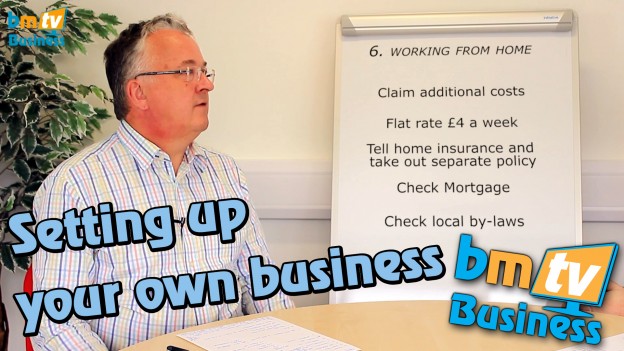This week we have the first of our new series of BMTV Business shows, these are dedicated to helping you working on your business rather than in your business as we often get asked for advice! So, to start us with the basics of setting up your business is Guy Robinson from Xebra Accounting.
- How are you going to trade?
The first thing you need to consider when setting up is how do you want to trade. Do you want to be a Sole Trader (just you in the business), a Partnership (you and one other person) or do you want to go straight into becoming a Limited Company? Being a Sole Trader or a Partnership is the easiest option as they don’t require you set up legal structures and you can just start trading straight away. A Limited Company requires a bit more setting up but provides you with limited liability which protects you should someone make a claim against you. Anyone can claim against you if you are a Sole Trader or Partnership. Limited Companies appear to be bigger than Sole Traders so a lot of people make the jump for this reason, sometimes it’s even required to be a Limited Company as some companies like councils will only trade with Limited Companies.
- Choosing your name
Essentially you can go with any name you like as long as it is not similar to someone else’s (especially if they are in a similar line of work to you). Your trading name doesn’t have to be your name or the name of your company, you could have a Limited Company for exmaple trading under a completely different name. There is no need to register you name but you can do if you wish, you can also trademark your name but these are all expensive things to do and many people don’t bother to begin with. What a lot of people do when they start off as a Sole Trader, is to buy the Limited Company version of the name straight away in case they need to move their company at a later date and this stops other people pinching the name in the meantime.
- Compliance
You need to inform HMRC that you are trading and there are timescales that you need to do this by. These are: by the 5th of October in your businesses second year if you are a Sole Trader or after 3 months of trading if you are a Limited Company. You also need to get your tax reference code from HMRC and disclose what you are earning to them. If your business turnover is less than £15,000 there is very little you need to tell HMRC, just your income, your expenditure and your profit. If you go over that threshold you need to start keeping accounts.
- Accounts
You will need some software to keep track of your accounts, the best known of these are Xero and QuickBooks online and we would thoroughly recommend these as they are easier to use than a spreadsheet. They record what’s going on in your business and we recommend you get a system from day one in your business. 80% of businesses that fail in their first year don’t have a plan of what they want to do, don’t have an accountant and don’t have an a accounting plan. You can almost guarantee success by have a good accounting system.
- Insurance
It is important that you have employer liability insurance as it is a legal requirement. You should look at public liability insurance as well, even though this is not a legal requirement the two types of insurance do go hand in hand. Public liability protects you if a member of the public claims against you and employer liability insurance protects you if your employees claim. In the balloon industry, if you are a member of NABAS or BAPIA then your membership will often cover you for public and employer liability. There are other non-balloon organisations out there like the FSB that do the same thing.
- Where are you going to work?
The next thing you need to look at is where you are going to work. Most people start working from home initially and this is probably the easiest option to begin with if you are a Sole Trader. You do need to be careful when working from home as sometimes it is a condition of your mortgage that you aren’t allowed or the local by-laws in your area may prohibit it. You just need to check with your local council. You are allowed to claim the extra cost incurred from working at home but you would need to work out the extra cost and keep receipts. There is a flat rate of £4 a week that you can claim without keeping receipts. You will need to tell your home insurance that you are trading and take out a separate policy to cover the business in your home. If your business grows then your house may be assessed as a business and you can involved in messy accounting.
That’s it for this week, we will be showing the rest of the interview with guy in future shows.
Until next time!
Rob
As always, you can get in touch with us by commenting below, sending us an email or commenting on Facebook and Twitter. If you would like to receive these weekly video updates, you can either keeping checking this blog, subscribe to email updates in your account settings or you can subscribe to our Youtube channel.




